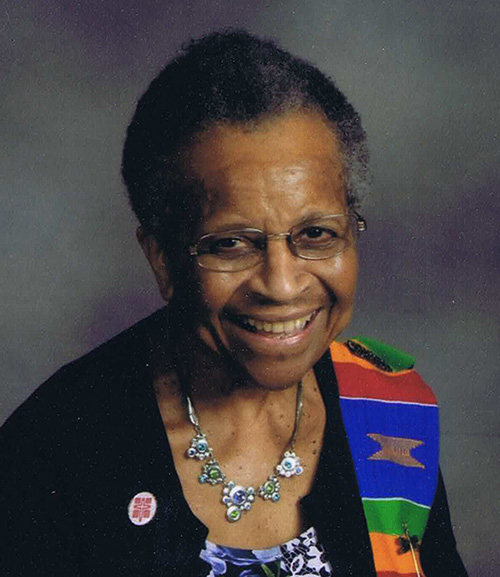
Sr. Cora Marie Billings desegregated the Sisters of Mercy community in Merion, Pennsylvania, in 1956. (Courtesy of Sisters of Mercy)
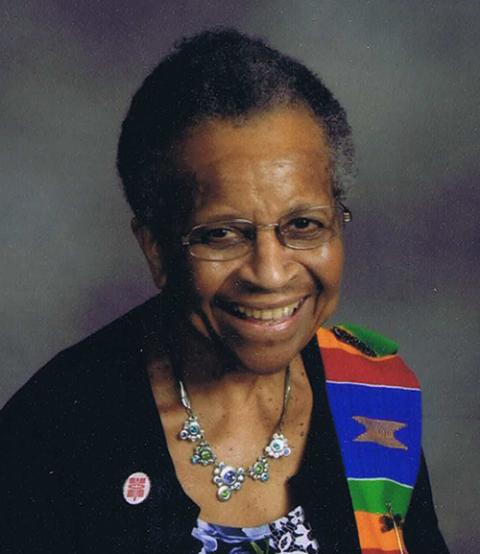
Sr. Cora Marie Billings desegregated the Sisters of Mercy community in Merion, Pennsylvania, in 1956. (Courtesy of Sisters of Mercy)
In 1956, 17-year-old Sr. Cora Marie Billings of Philadelphia entered the Sisters of Mercy in Merion, Pennsylvania, becoming the first Black member of the Philadelphia community.
Catholicism has always been a part of Billings' life, coming from a devout Black Catholic family who fought against racial barriers to fully participate in the Roman Catholic faith and tradition.
Her great-grandfather was enslaved by the Jesuits at Georgetown University in Washington, D.C.
"My great-grandfather served as a driver for the Jesuits. ... He would transport them to the convent of the Visitation Sisters, where they would celebrate Mass," Billings recounted in a first-person 2014 America Magazine article.
Her great-grandfather's 11 siblings were also enslaved. They were baptized Catholic, and their baptismal records are at Holy Trinity Church in Georgetown.
Billings was the third person in her family to enter religious life. In the 1940s, two of her aunts became members of the first successful Black Catholic order in the United States, the Oblate Sisters of Providence, founded in 1828 by Mother Mary Lange. Her aunts couldn't join other congregations at the time due to segregation.
Billings said the spirit of her aunts, Sister Mary Paul (formerly Susan Lee) and Sister Mary Agnes (formerly Bertha Lee), her ancestors and her strong devotion to Our Lady and St. Martin de Porres have remained with her throughout her six-decade career as a Black Catholic nun and given her the strength to combat various challenges throughout her life.
In addition to desegregating the Sisters of Mercy Philadelphia chapter, she has achieved several "firsts."
She was the first African American to teach in an all-white grade school in Levittown, Pennsylvania, as well as the first African American sister to teach in a Catholic high school in Philadelphia.
She was the first Black sister to work as a campus minister at Virginia State University and the first African American sister to lead a U.S. Catholic parish, working as a pastoral coordinator at St. Elizabeth Parish in North Richmond, Virginia.
She also led the Richmond Diocese's Office for Black Catholics for 25 years and served as director of the Human Rights Council for Virginia from 2007 to 2010. Billings is also a founding member of the National Black Catholic Sisters' Conference.
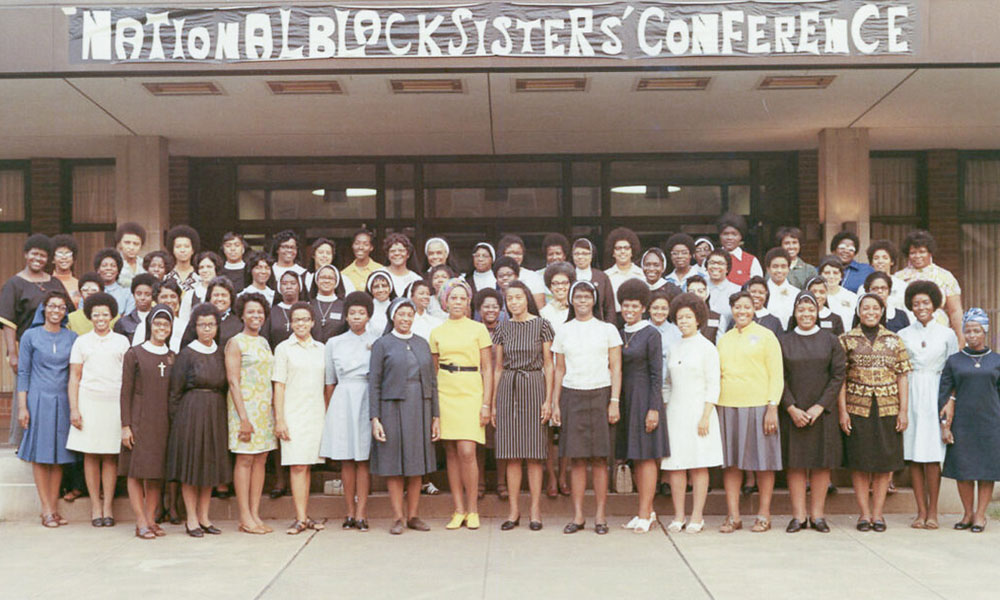
Early members of the National Black Sisters' Conference outside the conference headquarters in Pittsburgh in the early 1970s. Mercy Sr. Cora Marie Billings is fourth from the left in the front row. (Courtesy of Sisters of Charity of Nazareth)
In honor of Black Catholic History Month, established in 1990, Global Sisters Report interviewed Billings, who discussed her faith background, childhood upbringing, call to action for the Catholic Church and more.
GSR: What/who drew you to join the Sisters of Mercy versus a historically Black religious order?
I joined the Sisters of Mercy because they were one of the seven communities of sisters teaching at West Catholic High School [in Philadelphia] where I went to high school. I found them very hospitable, friendly, happy, and I was drawn to their charism. But I've also been asked why I didn't join the Oblate Sisters of Providence like my aunts did. I did not feel that that was for me. I feel that there's much more that I've been able to do, being where I am.
Can you recall any childhood memories that impacted your faith and spirituality? Did your family have any favorite prayers, songs or rituals?
I was an only child, and from third to eighth grade, I went to an elementary school in West Philadelphia in an area called the "Black Bottom." It was the real bottom of West Philly, and it was a predominantly Black community. It wasn't seen as one of the best neighborhoods in the area. When I went to school, I would be by myself. I walked eight blocks or more to school each day.
I had great devotion to Martin de Porres, and at the time he was "blessed." He was the only Black saint that we had. So, for me, that's showing some of the racism in the church because the other saints that were canonized in the last 10 years or so only died like 20 years ago. Martin died in 1639, and he wasn't canonized until 1962.
Martin was very close to me. I would pray and talk to him while walking to school. My school was predominantly white Irish with over 2,000 students. Probably only about 14 of us were African American, so I needed some connection to my own identity.
Catholicism has always been a part of me, and I tell people that I really would never have been able to be in and stay and live the life that I have if it wasn't for my faith. Even in grade school, going to school, the presence of prayer, faith and God were there.
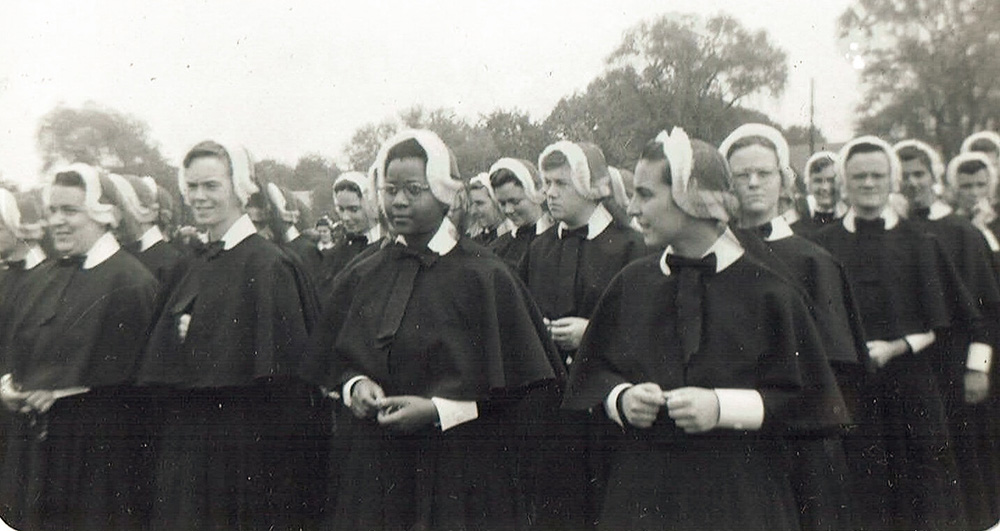
Sr. Cora Marie Billings enters the Sisters of Mercy in Merion, Pennsylvania, on Aug. 22, 1956. (Courtesy of Sisters of Mercy)
One of the most important prayers for me and my mother was the rosary. Part of that is I have great devotion to Our Lady because that's who I'm named after. My name means "heart of Mary." People think that name was given to me in religious life, but I was baptized with that name.
I also tell people that everything important in my life always happens on a feast of Our Lady. I was born on Feb. 11, Our Lady of Lourdes. I signed the paper to become a Mercy sister on March 25, the Annunciation. I entered on Aug. 22, the Immaculate Heart of Mary. When my mother died, I put a rosary on her coffin because that's what she had with her every single day.
I'm from New Orleans, where we've had our fair share of racism and discrimination, especially in the Catholic Church. My grandmother told me stories of how she had to sit in the very back of the church behind the whites, and because of that, they would sometimes run out of the Eucharist, and at other times she was even denied the host. Did you have any similar experiences or encounters of church-related discrimination?
I did during Communion at the altar rail when I was in the third grade. When it was time for Communion at the school Mass, we got in line and stood up on the altar step because we were small, right? The priests denied me Communion, and I always remember that day. The other girls in my class were all the same height, so for me not to get it, it had to be because I was Black.
Then at the age of 13 or 14, my family and I were at a predominantly white church in Maryland, where my father's family had property. At that time, the last three pews were reserved for Blacks, and the rest of the church was white. Everybody was seated in the church waiting for Mass to begin, and a white couple came in with a child. There were no seats in the front, so we had to get out of our seats and give them the seats.
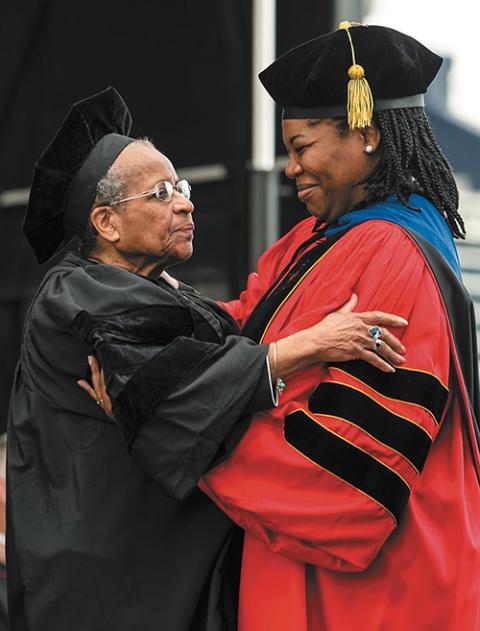
Shannen Dee Williams, right, a scholar well-known for her work highlighting the contributions of Black Catholic nuns and for the racism perpetrated against them, presents Mercy Sr. Cora Marie Billings with an honorary doctoral degree at Villanova University's commencement ceremony in May 2019. (Courtesy of Villanova University)
What does Black Catholicism mean to you? What do you want people to take away from this month and from Black Catholicism as a whole?
It means that I must, first, acknowledge that my culture, self-expression and identity are different than maybe a white person. Every person of color, or every African American, is not the same as me. I'm a Black Catholic. I must look at what I've come from, what I've experienced, and the impact that it has on me. I encountered racism, but it doesn't mean that it has to destroy me. Instances like that helped change me, and they helped me to look at things a little bit different.
One word that I've been saying a lot is intentionality. I feel that we need to be intentional and very specific about what we're doing and why we're doing it. We need to do our homework because what I'm finding sometimes in situations, people will be out there marching, and they don't even know why they're marching.
The other thing for the church I have found in the past is that a lot of times, people always depended on the bishops, priests or those in leadership to speak out about something that's wrong or unjust. For me, the church is the people of God, so me and the pew are just as responsible and accountable as the top leader might be for what happens in our church.
And I find that there's some of us that are still putting it on somebody else or making somebody else the scapegoat. We need to take risks sometimes, but I can only take a risk or confront an issue if I've really done my homework.
Black Catholics have struggled over their identity and their place/role in the church battling this question: How can we truly be our authentic selves and be Catholic? How can the Catholic Church further support the Black Catholic community? What action steps would you like to see?
There are too many African Americans who do not have a sense of worth and are not encouraged. What I want to see is more accountability and responsibility from leaders who are supposed to be educated.
I also want our bishops and church leaders to empower the people that are in the church. I want people to be willing to be vulnerable and admit that some of us make mistakes. As a person of color, I need to have that sense of empowerment and real support.
I love the Roman Catholic Church, and I'm going to stay in it, but I'm also going to complain when it's not doing what I feel that God is calling us to do.
What is the greatest lesson that your Catholic faith has taught you?
I think the greatest thing I've learned is the love that God has for people. I'm a person that likes interacting and connecting with people. Our faith is built on love, so I think my faith has taught me to love everyone, really look at our God, look at Jesus and to see how much love I can give to others.
Advertisement
The only person you can really change is yourself. You can help and lead people to change, but the actual change can only come from within.
If your ancestors were here physically with you now, what would you say to them? Do you think about them in your prayers?
I do think of them in my prayers, especially the ancestors that I really knew and interacted with, like my two aunts, mother, father and grandparents. I've also reflected on how my ancestors were enslaved and all the racial barriers they endured. I look at what they went through. I try to feel it because I think that a lot of times, we only act when it becomes a personal experience that we've had. So, I can't personally feel the lynching or the whips.
But by reflecting on it and intentionally trying to make their spirit a part of me will help me to really fulfill their wildest dream, which I think is to take all of the opportunities I've been given and empower people and encourage them.
I do not want history to repeat itself. That's the thing that's scary for me right now because I think history is repeating itself in various ways today, and I don't understand how that can happen with all the resources we have today.
Something that I learned from my family is if you don't know your history, it's most likely to be repeated. What is your message to young Catholics who are witnessing history repeat itself with police brutality, systemic racism and more? Why is it important for them to remain hopeful?
Learn and know what the past was and believe that you don't have to be a Martin Luther King to effect change. I can be taught to believe that I have the power, and at 7 years old, I noticed I had that power. God is the one that gives the power.
Having power comes with making decisions. I must do my homework so that I make the right decisions. There's so much that young people can give us because of their energy and insights.
Learn more about the contributions of Sr. Cora Marie Billings and another Black Mercy sister who had ties with Billings, Sr. Benvinda Pereira, by reading "Challenging & Healing Racism: Two Black Sisters of Mercy Share Their Stories," written by Catherine Walsh.







